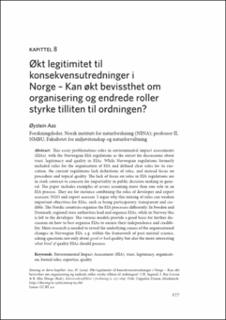Økt legitimitet til konsekvensutredninger i Norge – Kan økt bevissthet om organisering og endrede roller styrke tilliten til ordningen?
Chapter
Published version
Permanent lenke
https://hdl.handle.net/11250/3067115Utgivelsesdato
2019Metadata
Vis full innførselSamlinger
- Antologikapitler [15]
- Publikasjoner fra CRIStin - NINA [2364]
Sammendrag
This essay problematizes roles in environmental impact assessments (EIAs), with the Norwegian EIA regulations as the outset for discussions about trust, legitimacy and quality in EIAs. While Norwegian regulations formerly included rules for the organisation of EIA and defined clear roles for its execution, the current regulations lack definitions of roles, and instead focus on procedure and topical quality. The lack of focus on roles in EIA regulations are in stark contrast to concern for impartiality in public decision-making in general. The paper includes examples of actors assuming more than one role in an EIA process. They are for instance combining the roles of developer and expert assessor, NGO and expert assessor. I argue why this mixing of roles can weaken important objectives for EIAs, such as being participatory, transparent and credible. The Nordic countries organise the EIA processes differently. In Sweden and Denmark, regional state authorities lead and organise EIAs, while in Norway this is left to the developer. The various models provide a good basis for further discussion on how to best organise EIAs to ensure their independence and credibility. More research is needed to reveal the underlying causes of the organisational changes in Norwegian EIA, e.g. within the framework of post-normal science, asking questions not only about good or bad quality, but also the more interesting what kind of quality EIAs should possess. Environmental Impact Assessment (EIA), trust, legitimacy, organisation, formal roles, expertise, quality

